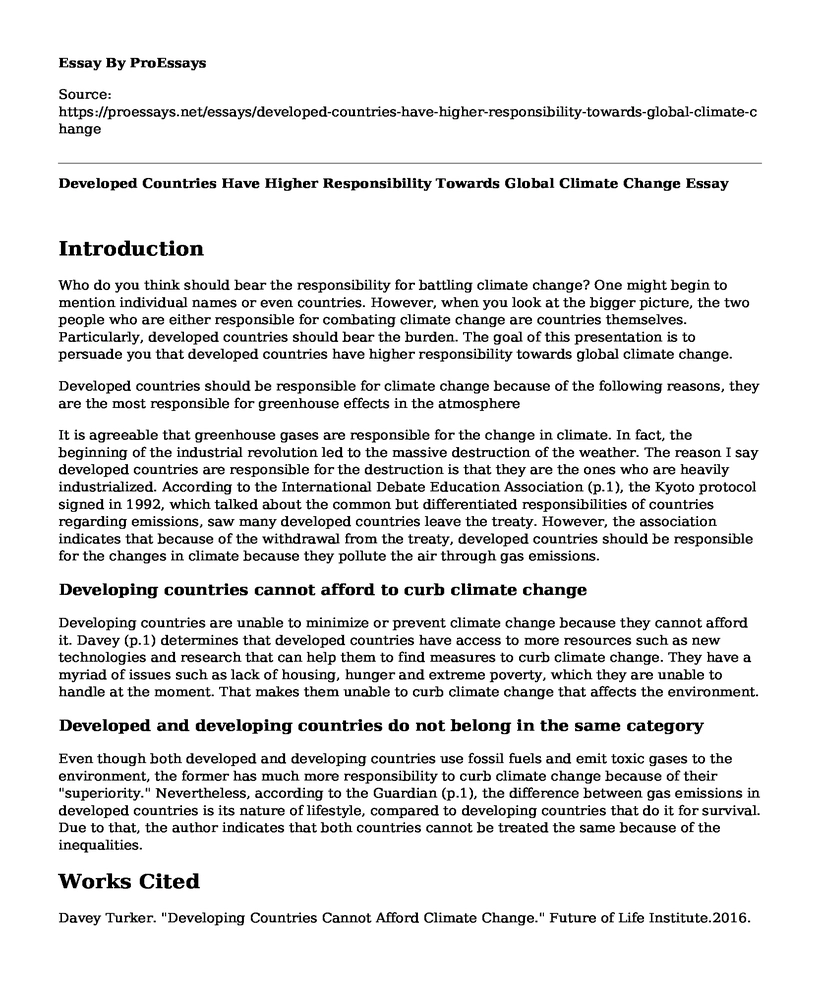Introduction
Who do you think should bear the responsibility for battling climate change? One might begin to mention individual names or even countries. However, when you look at the bigger picture, the two people who are either responsible for combating climate change are countries themselves. Particularly, developed countries should bear the burden. The goal of this presentation is to persuade you that developed countries have higher responsibility towards global climate change.
Developed countries should be responsible for climate change because of the following reasons, they are the most responsible for greenhouse effects in the atmosphere
It is agreeable that greenhouse gases are responsible for the change in climate. In fact, the beginning of the industrial revolution led to the massive destruction of the weather. The reason I say developed countries are responsible for the destruction is that they are the ones who are heavily industrialized. According to the International Debate Education Association (p.1), the Kyoto protocol signed in 1992, which talked about the common but differentiated responsibilities of countries regarding emissions, saw many developed countries leave the treaty. However, the association indicates that because of the withdrawal from the treaty, developed countries should be responsible for the changes in climate because they pollute the air through gas emissions.
Developing countries cannot afford to curb climate change
Developing countries are unable to minimize or prevent climate change because they cannot afford it. Davey (p.1) determines that developed countries have access to more resources such as new technologies and research that can help them to find measures to curb climate change. They have a myriad of issues such as lack of housing, hunger and extreme poverty, which they are unable to handle at the moment. That makes them unable to curb climate change that affects the environment.
Developed and developing countries do not belong in the same category
Even though both developed and developing countries use fossil fuels and emit toxic gases to the environment, the former has much more responsibility to curb climate change because of their "superiority." Nevertheless, according to the Guardian (p.1), the difference between gas emissions in developed countries is its nature of lifestyle, compared to developing countries that do it for survival. Due to that, the author indicates that both countries cannot be treated the same because of the inequalities.
Works Cited
Davey Turker. "Developing Countries Cannot Afford Climate Change." Future of Life Institute.2016. Accessible at https://futureoflife.org/2016/08/05/developing-countries-cant-afford-climate-change/
International Debate Education Association. "This house believes that developed countries have a higher obligation to combat climate change than developing countries." 2018. Accessible at https://idebate.org/debatabase/environment/house-believes-developed-countries-have-higher-obligation-combat-climate
The Guardian. "Paris climate talks: Developed countries must do more than reduce emissions." 2015. Accessible at https://www.theguardian.com/environment/2015/nov/23/paris-climate-talks-developed-countries-must-do-more-than-reduce-emissions
Cite this page
Developed Countries Have Higher Responsibility Towards Global Climate Change. (2022, May 09). Retrieved from https://proessays.net/essays/developed-countries-have-higher-responsibility-towards-global-climate-change
If you are the original author of this essay and no longer wish to have it published on the ProEssays website, please click below to request its removal:
- Paper Example on 1906 San Francisco Earthquake
- Importance of Forests and Oceans Paper Example
- What I Think Every Academic Should Know Essay Example
- Essay Sample on Climate Change Control
- The Significance of Flint Towards Environmental Injustice - Essay Sample
- LULUs: Unfair Land Use Impacts on Environmental Justice - Essay Sample
- Essay Example on Pollution Crisis: Transportation Sector a Major Global Source







